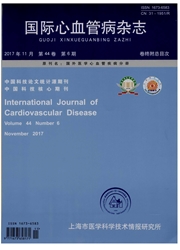

 中文摘要:
中文摘要:
目的:分析先天性心脏病患者GATA4基因的突变谱,揭示先天性心脏病的分子病因。方法:收集110例无血缘关系的先天性心脏病患者的临床资料和血标本,以100名无血缘关系的健康者为对照。应用聚合酶链反应扩增先天性心脏病相关基因GATA4的全部编码外显子和外显子两侧的部分内含子,采用双脱氧核苷链末端合成终止法对全部扩增片段进行测序。将所测的序列与GenBank数据库中的GATA4基因序列进行比对,识别出GATA4基因突变,并用序列比对在线软件ClustalW2分析突变氨基酸的保守性。结果:在3例无血缘关系的先天性心脏病患者的GATA4基因各识别出1个新的杂合错义突变,即P42T、V48M和S191I突变,这些突变不存在于正常对照者,而且突变氨基酸在哺乳动物进化上有高度的保守性。结论:该研究结果可能揭示了先天性心脏病新的分子病因,有助于先天性心脏病患者的早期防治。
 英文摘要:
英文摘要:
Objective: To perform the mutational analyses of the GATA4 gene in patients with congenital heart disease (CHD) in order to identify novel molecular etiology responsible for CHD. Methods:A cohort of 110 unrelated subjects with CHD and a total of 100 unrelated healthy individuals used as controls were recruited. The clinical datum were collected and the peripheral venous blood specimens were prepared. The genomic DNA was extracted from the peripheral blood lymphocytes. The entire coding exons and flanking partial introns of the GATA4 gene were amplified by polymerase chain reaction and the amplicons were sequenced using the di-deoxynueleotide chain termination procedure. The acquired sequences were aligned with those of GATA4 publicized in GenBank by the aid of program BLAST to identify the sequence variations. The online software ClustalW2 was used to ascertain whether the altered amino acids were evolutionarily conservative across species. Results: Three novel heterozygous missense mutations of GATA4, p. P42T, p. V48M, and p. S191I, were identified in 3 out of 110 unrelated CHD patients, respectively. The mutations were absent in the control individuals. The altered amino acids were highly conservative evolutionarily among mammals. Conclusion:These findings expand the mutation spectrum of GATA4 linked to CHD and reveal novel molecular defects associated with CHD, contributing to the early prophylaxis and timely therapy for CHD.
 同期刊论文项目
同期刊论文项目
 同项目期刊论文
同项目期刊论文
 期刊信息
期刊信息
